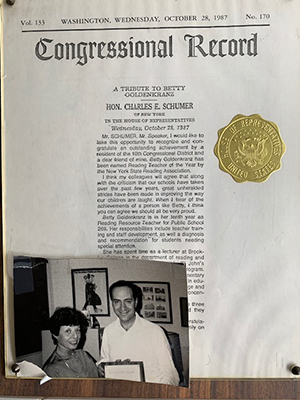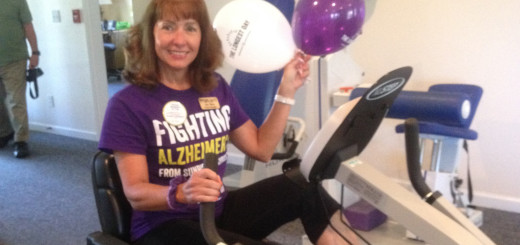Aptos couple loses ability to communicate as pandemic keeps them apart
Steven Goldenkranz met the love of his life, Betty, at age 18. Now, over 70 years later, Betty is living with dementia and cannot speak. Currently, Betty lives in a care setting that has been closed to visitors since the onset of the pandemic. Steven shares his wife’s story and how he now helps others in his support group.

Falling in love
Betty and Steven Goldenkranz met in 1949 while attending separate high schools in Brooklyn, New York. They dated on and off until 1951 when Steven enlisted in the United States Navy. By the time Steven was called in for basic training, their relationship grew serious.
Despite the distance, Betty and Steven continued to see each other whenever Steven was in town, which wasn’t often. Then, in September of 1952, Steven came home for Betty’s sister’s wedding.
“The two of us sat down and asked ourselves what do we want to do with our lives,” shared Steven. “I didn’t know where they were going to send me next. I looked at Betty, and Betty looked at me.
We said, “˜What are we doing bouncing around with this thing?’ Betty went straight home to her mom and said, “˜Steve and I are going to get married this year.'”
Steven and Betty married nine days after Betty’s sister.

Moving to a new country
Betty didn’t like the idea that her new husband would be living in a foreign country without her, so in November of 1952 she packed up and moved to Newfoundland, Canada. “I tell this to all newly married couples,” said Steven. “The smartest thing you can do is for the two of you to find somewhere that’s 1,000 miles away from your parents and start your married life leaning on each other instead of having the whole population come in.”
Betty was warmly welcomed into the community where other Navy couples were living. They were eager to help Betty acclimate to her new home and showed her around the city.
Life after the Navy
After Steven’s time in the service was over, Betty encouraged him to go back and finish college, which he did. At this point, Betty and Steven had three kids.
“Betty was a mom,” said Steven. “She stayed home with the children until all the boys were in school. Then she struck out on her own.”

Betty decided to go back to school where she received not only a bachelor’s degree but also a Master of Science in Education. “My wife was a class A recognized educator with the New York City Board of Education,” touted Steven.
“She was a reading specialist and worked in education for 28 years. She and a friend developed a peer tutoring program, where an older child would assist a younger child in learning and reading.
“In 1987, Betty received an award for Reading Teacher of the Year in New York State. She was acknowledged by our congressmen and entered into the Congressional Record, I have it hanging on the wall. She was a beautiful woman, incredible parent, and as a teacher, none were better.”
Living their best life
Betty and Steven both retired in 1995. Steven jokes, “This is when we started our relationship as wife and husband.” They spent the next several years living life to the fullest. They went to the opera and the ballet. They traveled and enjoyed their lives.
In the winter of 2007, Steven and Betty decided to spend Christmas in Jerusalem with their children and grandchildren, some of whom were already living there. It was there that Betty’s granddaughters came to Steven and expressed their concerns about Betty’s ability to walk. She was shuffling more than taking a step.
When Steven and Betty returned home, they spoke to their doctor and were referred to a neurologist. At the neurologist’s request, Betty had an MRI and, in 2008, was diagnosed with normal pressure hydrocephalus.
Normal pressure hydrocephalus
Normal pressure hydrocephalus (NPH) is a brain disorder in which excess cerebrospinal fluid (CSF) accumulates in the brain’s ventricles, causing thinking and reasoning problems, difficulty walking, and loss of bladder control.
The Hydrocephalus Association estimates that nearly 700,000 adults have normal pressure hydrocephalus, but it is often misdiagnosed as Alzheimer’s or Parkinson’s disease. In fact, less than 20 percent of people with the disease are properly diagnosed.

Moving across the country
In 2010, Betty and Steven came out to California for their 60th wedding anniversary. “Betty had started to degrade significantly,” said Steven. “It was quite recognizable that Betty had serious difficulties.”
During this trip Steven and Betty’s sons expressed their concerns about Betty. One of their sons, who was already living in Aptos, suggested that Steven and Betty move to California permanently. It took a few years, but in 2013 Steven and Betty sold their home in New York and moved to Aptos.
Supporting Betty
However, by January 2014 it was clear that Betty needed more help than Steven could provide. “We started using an in-home caregiver service,” said Steven. “It was the smartest thing I ever did. I will not take credit for it. I was pushed by my son and his wife.”
Betty had an in-home caregiver for four years until she could no longer manage the steps at her house. Eventually she moved to a small private care setting that is seven minutes from their home.
“I see her every other day,” shared Steven. “Her blue eyes would just knock you off your feet. She currently has no speech, but I think the wheels in her head are still turning. I believe she recognizes me.”
Keeping Betty safe
Unfortunately, because of the pandemic, Steven has not been able to touch his wife since March 13, 2020. “I see Betty from a distance now every other day where we make eye contact.
“I’m here in a situation with a wife who can no longer speak and now we’ve lost the tactile aspect of our relationship as well. It feels like my wife is stuck in a room and I can’t touch her. It’s impossible.”
Steven continues to see Betty from six feet away. While he would love to be able to touch his wife, he knows their separation is for Betty’s own safety.
Supporting others
Since moving to California, Steven has been regularly attending an Alzheimer’s Association® support group. He encourages people to be grateful for the time they have now.
“When I hear a caregiver say something about having difficulty with communications, I usually break in.” said Steven. “I ask them to do me a favor and be thankful for what is in front of them now. It could be like Betty where there is little to no communication.”
Originally encouraged to attend by his son, Steven has become a self-proclaimed poster boy for the Alzheimer’s Association. “You can’t make demands. It’s a tough road and it’s every day. To see someone degrade the way I saw Betty degrade, all you can offer is care and love.”
For more information on our virtual support groups visit our website or call our 24/7 Helpline at 800.272.3900.
Learn more:

















